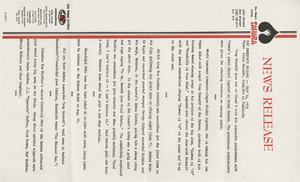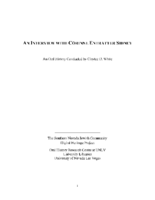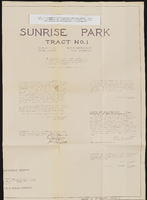Search the Special Collections and Archives Portal
Search Results

Press releases from the Sahara Hotel and Casino, 1976-1977
Date
Archival Collection
Description
Four press/news releases from the Sahara Hotel and Casino in Las Vegas, Nevada. The releases discuss entertainment news concerning various celebrities like Jerry Lewis, Don Rickles, Tony Bennett, Abbe Lane, Mary Welch, and Bruce Maxwell.
Text

Meeting minutes for Consolidated Student Senate, University of Nevada, Las Vegas, September 9, 1975
Date
Archival Collection
Description
Text
Jean Ford Photograph Collection
Identifier
Abstract
The Jean Ford Photograph Collection (1964-1977) contains black-and-white photographic prints, contact sheets, and transparencies of Nevada politician and activist Jean Ford. The collection includes photographs of Jean Ford with the Nevada State Park Commission and various Nevadan politicians; Ford lecturing and campaigning; and of the 1977 National Women's Conference in Houston, Texas.
Archival Collection
San Pedro, Los Angeles & Salt Lake Railroad Company Records
Identifier
Abstract
The collection is comprised of records of the San Pedro, Los Angeles & Salt Lake Railroad Company (1901-1976). The construction of this railroad led to the founding of Las Vegas, Nevada and the creation of the Empire Construction Company and Las Vegas Land and Water Company. The records document the company's operations and include correspondence and contracts relating to lots in the Las Vegas townsite, payments and accounts, invoices and other audit materials from 1905 to 1923. The collection also includes the records of the railroad agent at Arden Station, located ten miles south of the Las Vegas Station, which contain correspondence, ledgers, freight and way bills, shipping orders, and telegrams.
Archival Collection
Henry and Anita Schuster Papers
Identifier
Abstract
Collection is comprised of correspondence, speeches, essays, meeting minutes, photographs, research materials, publications, press clippings, awards, and event programs (1941-2011) that document the life of Henry Schuster, and his work with his wife Anita. Materials are mainly related to the Holocaust and to Holocaust memory and survivor organizations (especially the Holocaust Survivor's Group of Southern Nevada, which the couple founded, and L’Œuvre de Secours aux Enfants). Genealogical information is also included, as well as records of Henry Schuster’s time in the U.S. Army and his studies at the Manhattan Technical Institute.
Archival Collection
Joshua Abbey Papers
Identifier
Abstract
Collection is comprised primarily of files from approximately the early 1980s to 2017 detailing Joshua Abbey's theater and film career; his involvement with environmental efforts in Southern Nevada such as the Citizens Against Nuclear Waste in Nevada (CANWIN); and his involvement with the Jewish community in Las Vegas, including the Jewish Film Festival, the Jewish Federation, Temple Beth Sholom, and other organizations. The collection also includes information about the Jewish Community Center from the 1950s and a file on the film production of
Archival Collection

Interview with Wayne Albert Violette, January 12, 2005
Date
Archival Collection
Description
Text

Transcript of interview with Corinne Entratter Sidney by Claytee White, June 5, 2007
Date
Archival Collection
Description
Interview with Corinne Entratter Sidney by Claytee White on June 5, 2007. In this interview, Sidney talks about growing up with privilege in California, where her father served as the attorney general. She attended school at UCLA and took acting classes and signed with United Artists. She met Jack Entratter in Los Angeles and moved to Las Vegas and worked as a Copa Girl. She discusses Jack Entratter's generosity and influence in town, and his style, and their lifestyle together. She mentions the likes of Frank Sinatra, Lena Horne and Sammy Davis, Jr. and her extravagant life living at the Sands. After Jack's death in 1971, she moved back to Los Angeles, returned to acting, and wrote a newspaper column. On a visit to Las Vegas with George Sidney after Sidney's wife Jane died, Corinne and George began dating and were married shortly after. They moved back to Las Vegas together for a slower pace. She describes her love of Las Vegas and its continued growth.
Corinne Sidney's life story makes for fascinating reading. She was born in 1937, the daughter of Alice Polk, former Ziegfeld showgirl, and Carl Kegley, an attorney. She attended U. of C. Berkeley, transferred to UCLA, and was spotted by a talent scout who convinced her to enter a Miss USA contest. Corinne's runner-up status in the Miss USA contest led to job offers in acting, so she decided to study acting. This, along with her childhood lessons in ballet, piano, singing, tap dance and horseback riding, led to a contract with United Artists, freelance work, television parts, and plays. Around the age of 18, Corinne met Jack Entratter. Their relationship brought her to Las Vegas, where she worked as a showgirl at the Sands for a few months, and where she married Jack a few years later. They lived a fabulous lifestyle which included travel, beautiful homes, and friendships with noted celebrities. Corinne went back to acting in Los Angeles after Jack passed away, but then segued into writing a gossip column and hosting a television show. She reconnected with an old friend (George Sidney) by writing the obituary for his wife, and within a few months they were married. The Sidney's moved back to Las Vegas, where Corinne still makes her home today.
Text

Jocelyn Cortez interview, March 18, 2019: transcript
Date
Archival Collection
Description
Interviewed by Nathalie Martinez. Jocelyn Cortez is a Salvadoran-American immigration lawyer. She grew up on the Eastside of Las Vegas and grew up going to school in the Clark County School District and at UNLV before going to Law School at the University of Arizona. She is an engaged community member as an immigration lawyer working alongside the Culinary Union and the Latino Bar Association.
Text

